- Home
- Upton Sinclair
World's End Page 3
World's End Read online
Page 3
II
Lanny Budd had never been to school, in the ordinary sense of the word. For one thing, his mother so often took him on journeys; and for another, he taught himself as many things as it seemed safe to put into one small head. He remembered phrases of every language he heard, and that was saying a lot on the Riviera. He was forever picking at the piano, and if he saw people dance a new dance, he had learned it before they got through. All his mother had to do was to show him his letters, and presently he was reading every book in the house that had pictures. You might be surprised to hear that Beauty Budd considered herself a lady of literary tastes; it meant that she noted the names of the books she heard people talking about, bought them, read the first few pages, and then was too busy to look at them again. Sooner or later Lanny would get hold of them, and if he didn’t understand them, he would start pestering somebody with questions.
A good part of his education had come from listening. All sorts of people came to the house, and a well-bred little boy would sit quietly in a chair and not say a word. As a rule, people would forget that he was there, and have no idea that he was stowing things away in his mind: society and fashion, what people wore and what they ate, where they went and whom they met; the aristocracy of Europe and its titles; the rich people and their stocks and bonds, dividends and profits; the new cars, the new restaurants; the theaters and what they were showing, the operas and the names of the singers; the books that people were talking about; the journalists, the politicians, the heads of states—everything that was successful and therefore important.
When they were alone, the child would start in on his mother. “Beauty, what is taffeta, and what do you mean by cutting it on the bias? What are penguins and why are they like French politicians? What were the Dreyfusards, and why did the abbé get so excited when he talked about them?” It was hard on a mother who had developed to a high degree the art of taking part in conversation without bothering too much about details. With Lanny she had to get things right, because he would remember and bring them up again.
He had developed at a very early age the habit of cherishing some profound remark that he had heard one of his elders make, and getting it off in other company. Of course it would cause a sensation; and of course an active-minded child did not fail to enjoy this, and to repeat the performance. He had the advantage that he was operating behind a screen; for the elders seldom realize how shrewd children are, how attentively they listen, and how quickly they seize upon whatever is of advantage to them. The elders would say anything in a little boy’s presence—and then later they would be astonished to find that he knew about such matters!
The city of Cannes lay only a few miles from his home, and the mother would betake herself there for shopping, and to have her charms attended to. Lanny, having promised never to go away with anybody, would find himself a seat on a street bench, or in a sidewalk café; and sooner or later there would be someone taking an interest in a bright lad with wavy brown hair, lively brown eyes, rosy cheeks, and a shirt of gray oxford cloth open at the throat.
In this way he had met, during the winter before he went to Hellerau, Colonel Sandys Ashleigh-Sandys—do not pronounce the y’s—late of His Majesty’s Royal Highlanders in the Indian Northwest. The colonel had white mustaches and a complexion like yellow parchment; it was trouble with his liver. He wore a linen suit, comfortably cut. A member of the exclusive “British colony,” he would have turned away from any grown person who ventured to address him without a proper introduction; but when the tables were crowded and a small boy invited him to a seat, he did not think it necessary to decline. When the boy began to chat with all the grace of a man of the world, the colonel was inwardly amused and outwardly the soul of courtesy.
Lanny chose to talk about the latest popular novel he was halfway through. The old martinet with parasites in his liver questioned him about his reading, and found that this benighted lad had never read a novel of Scott, had never even heard of Dickens, and all he knew about the plays of Shakespeare was the incidental music of A Midsummer Night’s Dream, written by a Jewish fellow. Lanny asked so many questions, and was so serious in his comments, that before they parted the colonel offered to send him a one-volume edition of the poet which he happened to be able to spare. One condition would be imposed—the lad must promise to read every word in the book.
Lanny had no idea of the size of that promise. He gave it, and also his name and address, and a couple of days later there arrived by the post an elegant tome weighing several pounds. It was the sort of work which is meant to be set upon a drawing-room table and dusted every day but never opened. Lanny kept his pledge literally, he began at the title page and spent a month reading straight through, in a state of tense excitement. He wore his mother out at mealtimes, telling her about the lovely ladies who were accused of dreadful crimes which they had not committed. Just what the crimes were supposed to be was vague in Lanny’s mind, and how was his mother to answer his questions? What did a man mean when he said he knew a hawk from a handsaw, and what were maidenheads and how did you break them?
Presently there was Lanny making himself swords out of laths and helmets out of newspapers, and teaching fishermen’s children to fence and nearly poke one another’s eyes out! Shouting: “Zounds!” and “Avaunt, traitor!” and “Lay on, Macduff!” down on the beach! Spouting poetry all over the place, like an actor—maybe he might turn out to be that—how was any woman to know what she had brought into the world? It was evident to her that this child’s imagination was going to carry him to strange places and make him do uncomfortable things.
III
Lanny and Kurt, arriving at Cannes, parted company before they left the train. The German boy was to be met by his aunt; and this widow of the Court-Counselor von und zu Nebenaltenberg was a person with old-fashioned notions who would probably disapprove of Americans on general principles. The situation turned out to be even more difficult, for the aunt knew or professed to know all about “that Budd woman,” as she called Beauty, and was shocked that her nephew had met such a person. She wouldn’t say what it was—just one word: “Unschicklich!”
Kurt asked no questions. “Mrs. Budd has gone to Scotland for the shooting season,” he remarked, casually. He sat erect in the stiff chair, facing the meager, severe old lady, telling her the news about the many members of their family. He ate a sound German luncheon of rye bread with slices of Leberwurst and Schweizerkäse, followed by a small Apfelkuchen and a cup of weak tea with milk. When the two had finished this meal, the aunt laid out the proper portions of food for her solitary maid, and then opened a cedar chest which stood between the windows of the dining room, and stowed all the remaining food therein, and carefully locked the chest with one of a bunch of keys which she carried at her waist. “You can’t trust these native servants with anything,” said the Frau Doktor Hofrat. Her husband had been dead for ten years, but she still wore black for him and of course carried his titles.
However, she was a woman of culture, and in due course asked about Hellerau, and Kurt told her. She was prejudiced against Jaques-Dalcroze because he had a French name and beard; but Gluck’s music was echt deutsch, so the Frau Doktor Hofrat asked questions and wished that she might have seen the Festspiel. Only after Kurt had awakened her curiosity to the utmost did the budding diplomat mention that his American boy friend had a real gift, and might assist him to give a Dalcroze demonstration. He was a very well-bred and polite boy, Kurt assured his aunt; he was only thirteen, and probably knew nothing about the “Unschicklichkeit” of his mother. Furthermore, he was an artist, or going to be, and one should not judge persons of that sort by ordinary standards. Consider Wagner, for example. Concerning even Beethoven there had been rumors …
By such insidious devices Kurt won his aunt’s permission to invite Lanny Budd for tea. A telegram was dispatched, and the Budd chauffeur drove Lanny over at the proper hour. He entered a plain, immaculate apartment, clicked his heels, bowed from the waist, a
nd apologized for his German—which really wasn’t so bad, because he had had two German tutors, each for several months. He ate only one tiny sandwich and one cooky, and declined a second cup of tea. Then while Kurt played the piano he gave demonstrations of what the Dalcroze people called “plastic counterpoint”; the elderly widow played folk songs which Lanny did not know, and he listened, and invented movements for them, and made intelligent comments while he did so. The Frau Doktor Hofrat did not tell him that she had once lost a little boy who had brown hair and eyes like his; but she invited him to come again, and gave her consent for Kurt to visit his home.
So all was well, and the youngsters were turned loose to enjoy life in their own fashion. The luncheon that Kurt had with Lanny wasn’t any frugal German meal. Leese prepared a mostele, an especially good fish which the boys caught; also an omelet with fresh truffles, and then fresh figs with cream and cake; that was the way they lived at the Budds’, and any peasant woman was happy to serve two handsome lads who had such good appetites and paid so many compliments to the food.
The two boys lived in bathing trunks, which sufficed for clothing in this free and easy playground of Europe. They walked out along the peninsula to the Cap d’Antibes, where you could dive off the rocks into thirty feet of water so clear that you expected to reach the bottom. They hauled a seine on the shallow beach and brought in shrimp and squid and crabs and other odd forms of life which had swarmed in these waters for ages and had been hauled out by Roman boys, Greek boys, Phoenicians, Saracens, Barbary corsairs—children of unnumbered races which had invaded this “Azure Coast” since the land had sunk and let the water in.
From his earliest days Lanny had lived in the presence of this long past. He had learned geography in the course of motor trips, and his history lessons had come from asking about old ruins. People didn’t always know the answers, but there would be a guidebook in one of the pockets of the car, and you could look up Arles or Avignon or whatever it might be. Antibes, which lay on the other side of the promontory, had once been a Roman city, with baths and an arena and an aqueduct; it was fascinating to look at the remains and think about the lives of people long gone from the earth which once they had held with pride and confidence. Not long ago, there had been dug up a memorial tablet to the little “Septentrion child” who had “danced and pleased in the theater”; Lanny Budd might have been that child come back to life, and he wondered how his predecessor had lived and what had brought him to his untimely end.
The two boys of the year 1913, having no idea what their ends were to be, wandered happily over the hills and valleys which run back from this coast. There was an endless variety of scenes: swift rivers, deep gorges, broad valleys; olive groves and vineyards, forests of cork oak and eucalyptus, meadows full of flowers; crowded villages, with terraced land cultivated to the last precious inch; palaces of Carrara marble with elaborate gardens and flowering trees—so many things to look at and ask questions about! Kurt couldn’t talk to the peasants, but Lanny would translate for him, and the women noted the bright blue eyes and yellow hair of the strange lad from the North, and had the same thought as Pope Gregory, who had inspected the war prisoners and remarked: “Not Angles, but angels.”
IV
High above Antibes is an ancient monastery, with a church, Notre-Dame-de-Bon-Port, from which the sailors of Antibes, barefooted and wearing white shirts, carry an image of the Virgin in a procession, so as to enjoy her protection from storms. From here there is a view of all the seas, the white cities of the Riviera, and distant Italian mountains capped with snow. To this place the boys brought their lunch, and Lanny pointed out the landmarks: to the west the Estérels, mountains of blood-red porphyry, and to the east the large city of Nice, and beyond it Monaco on its rock. Directly below them, in the bay, French warships were anchored; it was their favorite resting place, and sailors swarmed in the little town.
The boys spent the afternoon on this height, talking not merely of the scenery, but of themselves and what they planned to make of their lives. So serious they were, and so conscientious! Kurt was an ethical person, and when he revealed the moral compulsions of his soul, Lanny was quite awe-stricken.
“Did you ever think how few really cultured persons there are in the world?” inquired the German boy. “There are whole races and nations with practically none, and in the rest just a handful, holding aloft the banner of good taste, among so many millions of Hottentots.”
“What are Hottentots?” asked Lanny, naïvely.
Kurt explained that this was a way of referring to persons without culture or ideals. The great mass of men were like that, and civilization was kept going by the labors of a devoted few. “Suppose they were to fail—what then?”
“I never thought about it,” admitted the other, worried.
“We should sink into barbarism again, into another dark age. That is why the mission of art is such a high one, to save humanity by teaching a true love of beauty and respect for culture.”
Lanny thought that was a very wonderful way to look at it, and said so. Kurt went on:
“We who understand that have to discipline ourselves as if for a priesthood. We have to make the most of our powers, living an ordered life and not wasting ourselves as so many musicians have done. I have made up my mind to be one who lives a life of reason, like Bach or Brahms. Do you know about them?”
“Not very much,” Lanny had to admit.
“Of course I don’t know how much talent I may have—”
“Oh, I’m sure you have a wonderful talent, Kurt!”
“Whatever it is, I want to cherish it and put it to service. Have you thought about doing that with your life?”
“I’m afraid I never had any great thoughts like yours, Kurt. You see, my parents don’t take things so seriously.”
“Surely they have taught you some ethical standards!”
“Well, they told me to enjoy the beautiful things I came upon; and of course to be polite to people, and kind, and learn what I can from them.”
“That’s all right, only it’s not enough. One must have a wider vision, nobler aims.”
“I see it, Kurt, and I appreciate your telling me about it.”
“Of course, one doesn’t talk about such things except to a few chosen persons, who are capable of understanding one’s soul.”
“I realize that,” said Lanny, humbly; “I’ll try to be worthy of the trust. I’ll be a sort of disciple, if I may.”
The older lad agreed to accept him on that basis. They would correspond and tell each other their deeper longings, not keeping them locked up, as one had to do in a world of shallow and thoughtless people. When the sun began to drop behind the Estérels and the pair started down the road, they felt that they had had a sort of religious experience, such as might have come to the monks who through many centuries had paced the corridors of that monastery.
V
It was Kurt’s idea that his new disciple should be invited to visit the great Castle Stubendorf during the Christmas holidays; and to this end it was desirable that he should cultivate the esteem of the Frau Doktor Hofrat, whose recommendation would decide the matter. So Lanny came several times to the apartment in Cannes, and danced “Dalcroze” for some of the friends of the severe and straitlaced German lady. Never once did anyone mention his mother or his father, or any of his American associates; but the Frau Doktor Hofrat probed his mind, and made certain that he had a genuine respect for the contributions of the Fatherland to the world’s culture. At Kurt’s suggestion, Lanny borrowed a volume of Schiller’s poetry, and struggled diligently with it and asked the old lady’s help now and then.
She also interested herself in his musical education, which had been of a deplorably irregular character. Kurt, like his aunt before him, had had a sound German training in piano technique; a veritable military drill; arms and wrists stiff, knuckles depressed, second joint elevated, fingers pulled up and sharply pushed down. But poor Lanny had got a hodge-podge of eve
rything that friends of his mother had been moved to recommend. First had come Professor Zimmalini, protégé of the mother-in-law of Baroness de la Tourette. Having been a pupil of a pupil of Leschetizsky, the professor laid great stress upon equality of the fingers; the wrists depressed, the knuckles arched, the fingers rounded, the elbows curved even in ordinary legato. Lanny had been taught that for a whole winter; but then had come the London season, and after that Biarritz, and by the time they returned to their home, the professor had moved to Paris.
So then Lanny had a spell of the Breithaupt method, at a still higher price. He was told about forearm rotary motion, the importance of relaxation, and the avoidance of devitalization. But the excitable French professor who taught him all this suddenly fell under the spell of a stout concert singer and went off to the Argentine as her accompanist. Now Beauty had heard about a Professor Baumeister, who had recently come to Cannes, and she had told Lanny in her offhand way to take lessons from him if he wanted to. But Lanny hadn’t got around to thinking about it yet.
When the Frau Doktor Hofrat heard all this her orderly German soul was shocked. This poor child was playing the piano half a dozen ways at the same time; and the fact that he was perfectly happy while doing so made it even worse. She assured him that the Herr Professor Baumeister was no better than a musical anarchist, and recommended a friend who had once taught at Castle Stubendorf and would impart the official German technique. Lanny promised to put this recommendation before his mother, and thereby completed his conquest of Kurt’s aunt. She took the two boys to a concert—the one extravagance she permitted herself.

 Prince Hagen
Prince Hagen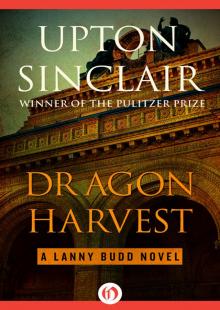 Dragon Harvest
Dragon Harvest The Jungle
The Jungle Sylvia's Marriage
Sylvia's Marriage Oil! A Novel by Upton Sinclair
Oil! A Novel by Upton Sinclair The Coal War: A Novel
The Coal War: A Novel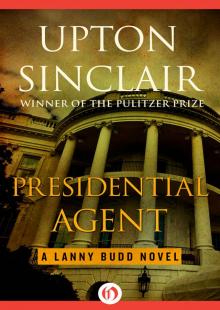 Presidential Agent
Presidential Agent World's End
World's End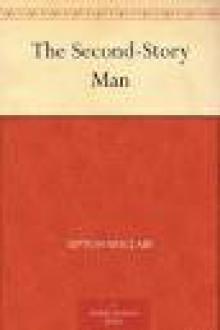 The Second-Story Man
The Second-Story Man O Shepherd, Speak!
O Shepherd, Speak! Wide Is the Gate
Wide Is the Gate The Return of Lanny Budd
The Return of Lanny Budd One Clear Call I
One Clear Call I 100%: the Story of a Patriot
100%: the Story of a Patriot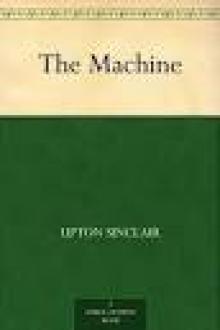 The Machine
The Machine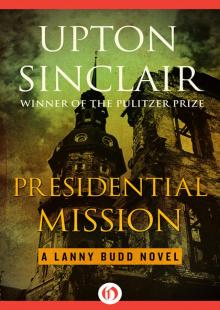 Presidential Mission
Presidential Mission A Cadet's Honor: Mark Mallory's Heroism
A Cadet's Honor: Mark Mallory's Heroism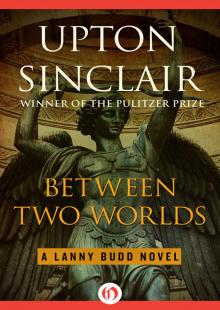 Between Two Worlds
Between Two Worlds World's End (The Lanny Budd Novels)
World's End (The Lanny Budd Novels)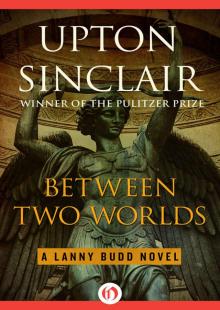 Between Two Worlds (The Lanny Budd Novels)
Between Two Worlds (The Lanny Budd Novels) The Coal War
The Coal War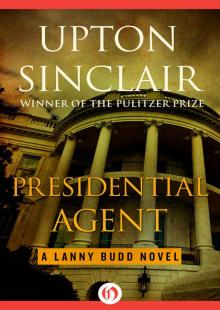 Presidential Agent (The Lanny Budd Novels)
Presidential Agent (The Lanny Budd Novels) Oil (filmed as There Will Be Blood)
Oil (filmed as There Will Be Blood) Wide Is the Gate (The Lanny Budd Novels)
Wide Is the Gate (The Lanny Budd Novels)